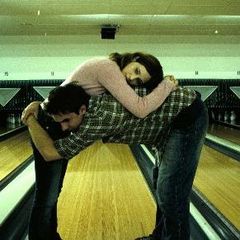 SPOILERS
SPOILERSI've watched a couple of movies in the last week with a Wizard of Oz Syndrome. Heck, in The Game Michael Douglas even said he's pulling back the curtain because he wants to "meet the Wizard."
"And what is the Wizard of Oz Syndrome?" you may ask. Well, it's when you flip around the majority of the reality of everything preceeding the big reveal, the moment our hero or heroine wakes up and says, "I've had the oddest dream. And you were there. And you were there. And..." That is the case with The Game, albeit with a thriller twist. And like most WoOS movies, the satisfaction is in the ending. If it doesn't work, the film doesn't work.
The ending in the Game works for me. It rendered everything before it implausible, but I gladly hand over my disbelief in return for a mind-bending thrill ride with one of my favorite actors, Michael Douglas, and the handiwork of director David Fincher.
I must admit, the film loses some quality of experience on repeated viewings, but very few movies can rival the excitement I felt when I first watched it. First, problems. I found some of the hijinks to fall a little flat this time through. "Hijinks in a thriller?" you might say. Consider them "thriller hijinks." Michael Douglas gets tossed into this game that really kicks off with might be considered an unorthodox "meet-cute" scene not that much different from your average, run-of-the-mill romantic comedy. Only, in the Game, the guy and gal are being chased by police and angry dogs. The snappy dialogue between Douglas and the woman in the scene, played by Deborah Kara Unger, is a real bump out of the film. First, it's not realistic. Second, it's too cute. This movie is actually really dark and that scene really sticks out as one of those "Sesame Street - one of these things is not like the others" moments. Another one of those moments occurs when Douglas interacts with his televison's personality.
The implausibility of the plot does not keep me from loving this film, but it can prove bothersome when the big reveal happens. Even though I labeled this post with a "SPOILER" warning, I'm not going to ruin the twists and turns of the story. Just know that you do have to lay down your better judgment for a moment. It's not difficult to do, I swear.
The film really hits its stride after Douglas starts to unravel the mystery in Christine's apartment. The action picks up, the stakes rise, and all is right in the world of entertainment.
Pluses are many. Michael Douglas gets to do some of his familiar but amazing acting tricks. He plays the rich sour puss. He plays the man at the end of his desperation rope. He plays the vengeful spirit for all its worth. He does all this with considerable skill, which makes the "thriller hijinks" stand out all the more. But he is the audience's eyes and ears into this labyrinth of a mystery. And he portrays all the desperation, frustration, and confusion I felt as I watched The Game for the first time. Because I felt so connected to his character throughout the film, I felt the ending was justified and earned. So, the success of the film should be placed on Douglas' shoulders.
Sean Penn gets to do his familiar acting tricks. He plays it smooth, then lets out his whining shouts in that warbling foul-mouthed child's voice of his. But I like the guy and his talent. His role is small, but Penn knows how to support the lead. Sure, he chews some scenery, but there are few who I would rather watch chow down.
Fincher is the other driving force in the film. He doesn't appear for one second in the film, but his eye for staging a scene is always there. He uses a lot of low angles, hard lighting, and adds a gray tint to the movie. It adds to the already dark tone of the film. The low angles, coupled with various skewed angles portray the confusion of the film. The lighting and camera work during the scenes that take place at night are really remarkable considering many of the key scenes occur outside after dark. Fincher knows how to get the most out of his actors. Much has been written about his obsessive nature as a filmmaker, but I think the results are enough to excuse any hard headedness the guy throws around. He makes good movies. Even when they're so-so (Panic Room), they're made better than most of the movies out there. I say this because he knows how to construct a film. The credits show puzzle pieces splitting apart, and that is essentially what his films are - carefully designed puzzles that he can seperate and put back together at his choosing. The guy really knows how to build suspense and capitalize on the emotions of his audience.
Another big plus is the score. It contains one main theme, but that little piece of music accentuates the chills and thrills that are peppered throughout the film. Timed perfectly with the action on screen, the score often much scarier than what a piece of music has any right to be.
Themes...Well, the movie centers around a "remember what's really important in life" theme. Added to that is the idea that your life is your own; and death doesn't have to be a monkey on your back. While these themes are not exactly subtle, they are nowhere near a hinderance to the enjoyment of the film. And I can't really argue with them. But the real reward for living is the embrace of the good you have and could have if only you would let yourself have it. And it needs to be said even if it's shoved in your face a bit.
***1/2







